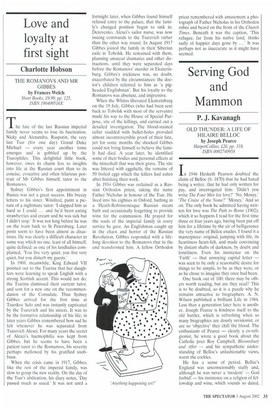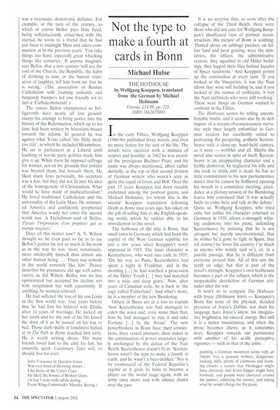Serving God and Mammon
P. J. Kavanagh
OLD THUNDER: A LIFE OF HILAIRE BELLOC by Joseph Pearce HarperCollins, £20, pp. 318, ISBN 0002740958 In 1946 Hesketh Pearson doubted the claim of Belloc (b. 1870) that he had hated being a writer, that he had only written for pay, and interrogated him: 'Didn't you write The Four Men for love?"No. Money.' 'The Cruise of the Nona?' Money.' And so on. The only book he admitted having written for love was The Path to Rome (1902), which it so happens I read for the first time three or four years ago, having been put off him for a lifetime by the air of belligerence the very name of Belloc exudes. I found it a masterpiece: original, jumping with life, its heartiness heart-felt, and made convincing by distant shafts of darkness, by doubt and loneliness. Even his insistence on the 'Faith' — that annoying capital letter — was seen to be only a reasonable desire for things to be simple, to be as they were, or as he chose to imagine they once had been.
One book out of 100: there may be others worth reading, but are they read? This is to be doubted, so it is a puzzle why he remains attractive to biographers. A. N. Wilson published a brilliant Life in 1984. Less than a generation later here is another. Joseph Pearce is kindness itself to the old battler, which is refreshing when so many biographies are dourly revisionist, or are so 'objective' they chill the blood, The enthusiasm of Pearce — clearly a co-religionist, he wrote a good book about the Catholic poet Roy Campbell, Bloomsbury and After — and his sympathetic understanding of Belloc's unfashionable views, warm the cockles.
He has a sense of period. Belloc's England was unconscionably stuffy and, although he was never a 'modern' — God forbid! — his insistence on a religion of fellowship and wine, which sounds so dated, was a necessary, democratic defiance. For example, at the turn of the century, to which of course Belloc pays little heed, being selfconsciously concerned with the eternal, he wrote to a friend that he had just been to midnight Mass and taken communion as in the previous years: 'You take things too hard, especially great whacking things like centuries. If anyone imagines, says Belloc, that a new century 'will see the end of the Church, the Republic, the habit of drinking in inns, or the human relaxation of laughter, tell him from me that he is wrong.' (The association of Roman Catholicism with foaming tankards and burgundy bumpers led one friendly wit to dub it 'Cathalcoholicism'.) The causes Belloc championed so belligerently have nearly all lost ground; except his attempt to bring justice into the history of the Reformation, which up to his time had been written by historians biased towards the reform. In general he was against what Yeats called 'the filthy modern tide', in which he included Bloomsbury. He sat in parliament as a Liberal until loathing of servile party politics made him give it up. While there he opposed suffrage for women, not on the grounds that politics was beyond them, but beneath them. He liked many Jews personally, his secretary was a Jew, but they did not fit into his idea of the homogeneity of Christendom. What would he have made of multiculturalism? He loved traditional Catholicism and the universality of the Latin Mass. He mistrusted America and confidently prophesied that America would not enter the second world war. A Frenchman said of Belloc, Pimpression d'un prophete qui se trompe toujours.'
Does all this matter now? A. N. Wilson thought so; he even goes so far as to say Belloc's genius lay not so much in his work as in the way he was 'more notoriously, more intolerably himself than almost any other human being. ... There was nobody in the world remotely like him.' Pearce describes his premature old age with admiration, as did Wilson. Belloc was no less opinionated but accepted his decline not with resignation but with equanimity. if anything, he seemed relieved.
He had suffered the loss of his son Louis in the first world war; four years before that he had lost his beloved wife Elodie after 14 years of marriage. He locked up her room and for the rest of his life kissed the door of it as he passed on his way to bed. Those dark shafts of loneliness hinted at in The Path to Rome reached him early. He is worth writing about. His many friends loved him to the end; his fun, his unservile spirit. Cautionary Tales will, or should, live for ever:
John Vavasour de Quentin Jones Was very fond of throwing stones...
Like many of the Upper Class He liked the Sound of Broken Glass.
(A line I stole with subtle daring From Wing-Commander Maurice Baring.)



























































 Previous page
Previous page